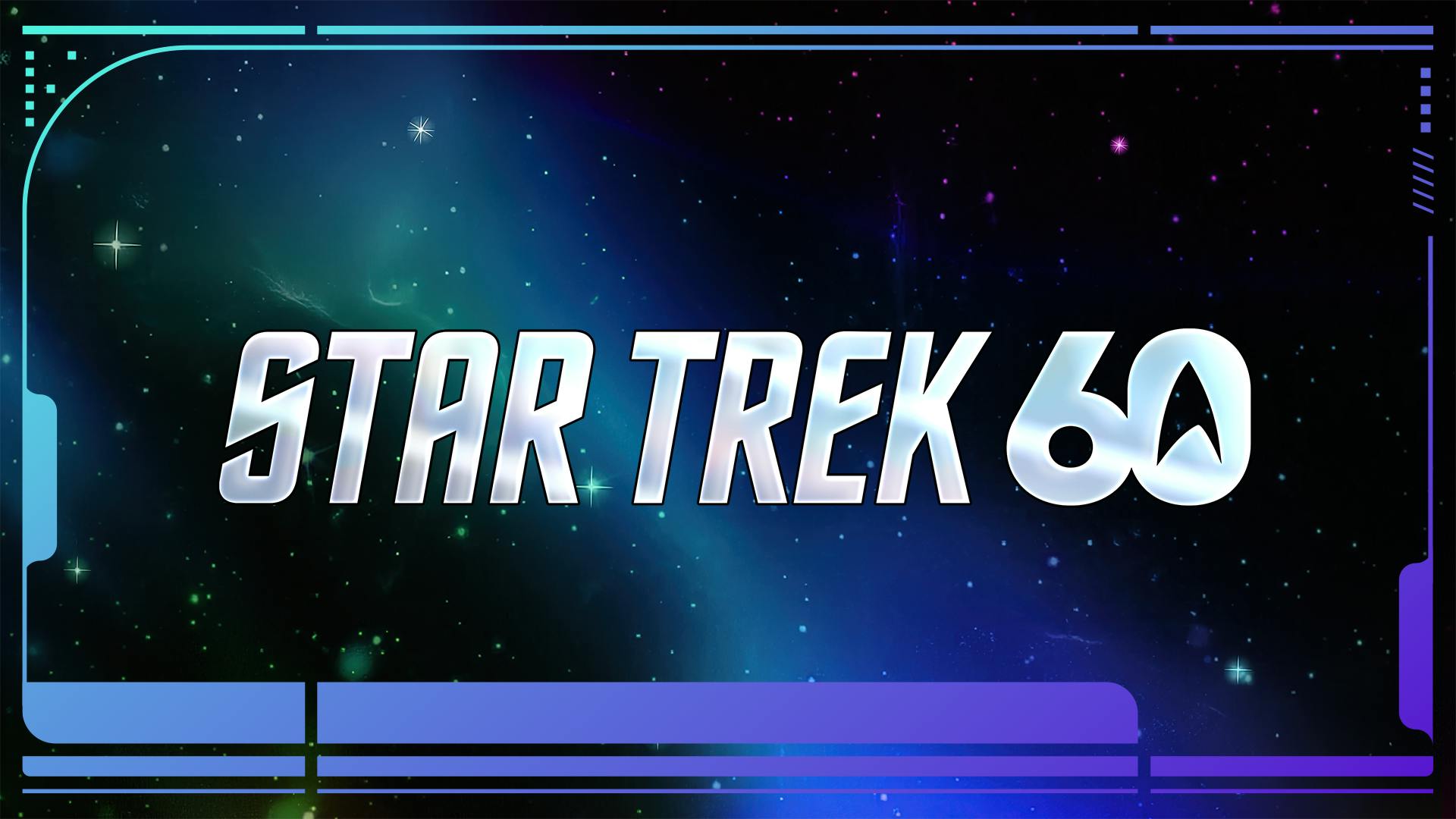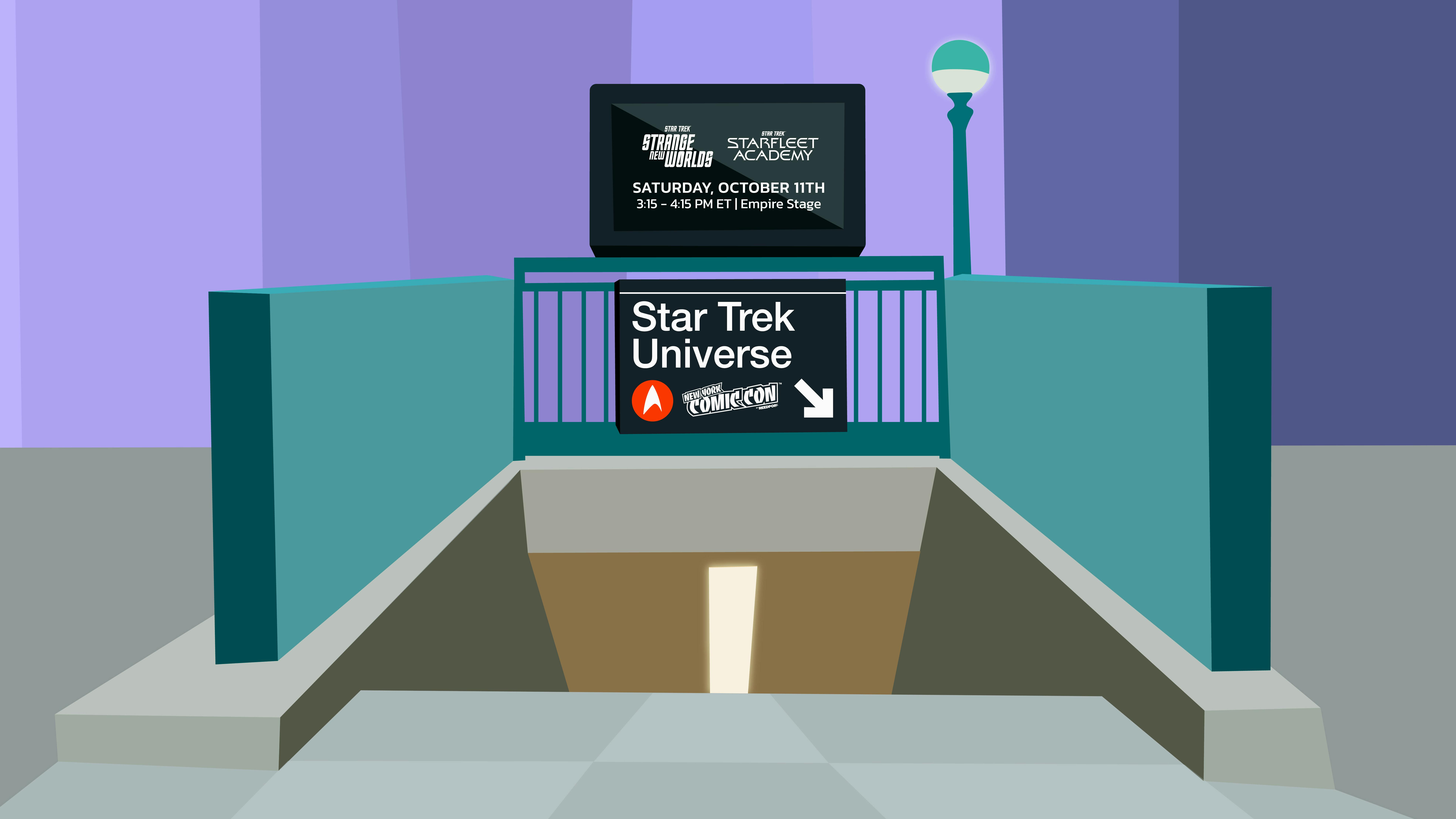Published Dec 15, 2023
The Cast of Star Trek: Strange New Worlds Dives into Season 2 and Teases Season 3
All the juicy tidbits we learned from the hour-long panel discussion!
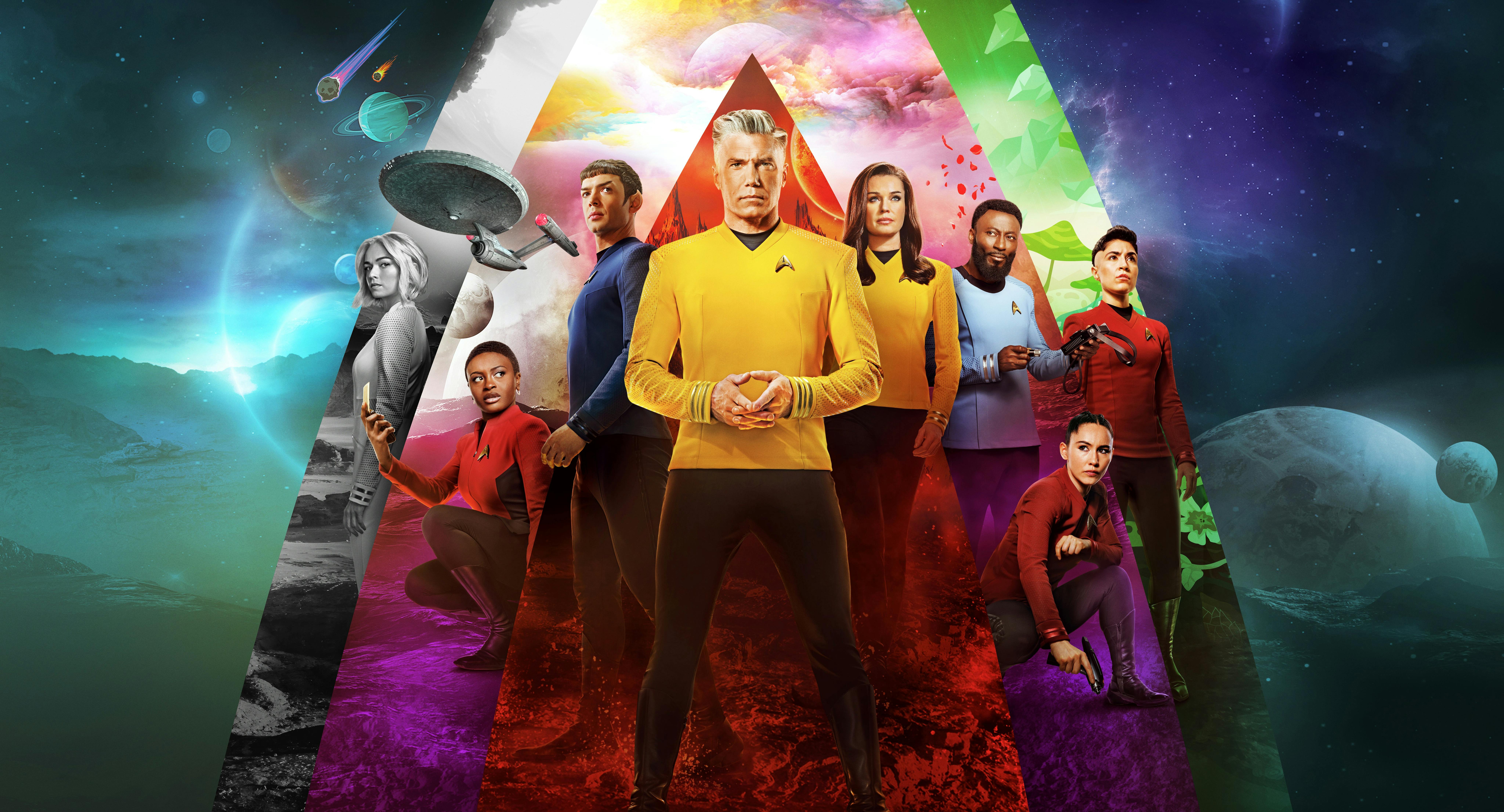
StarTrek.com
Following the announcement that , the SAG-AFTRA Foundation released a Zoom panel discussion as part of their Conversation series with cast members Anson Mount (Captain Christopher Pike), Rebecca Romijn (Una Chin-Riley/Number One), Ethan Peck (Spock), Jess Bush (Nurse Christine Chapel), Christina Chong (La'An Noonien-Singh), Celia Rose Gooding (Nyota Uhura), Melissa Navia (Erica Ortegas), and Babs Olusanmokun (Dr. M'Benga).
In addition to celebrating their first week back in production, the cast also received news this month that Star Trek: Strange New Worlds received a Critics Choice Awards nomination for Best Drama Series, along with a nom for Best Supporting Actress in a Drama Series for Celia Rose Gooding.
The hour-long conversation spans several topics from the second season, including the crossover with Star Trek: Lower Decks and a franchise-first musical episode, with teases to the third season. Here are the biggest things we learned from the discussion!
Star Trek's First Ever Musical Episode
Anson sums up the experience by revealing what showrunner Akiva Goldsman shared with the cast, "It's an idea that should not have worked and somehow it did."
And how did the musical episode came about in the first place? Bush cheekily reveals upfront, "It was Chrissy [Chong]'s fault that this all happened," with Olusanmokun backing her up. Chong herself admits, "I was incredibly excited. It was one of my dreams to do that, to be in a film or TV musical. So for me, it was literally my career coming 360 and living out a dream."
As for Mount, he recounts, "We'd kind of been lobbying the showrunners to do something like that for a while. Not because I'm a singer. I'm definitely not as you can see, but I like 'oh shit' situations. I think they're really good for creativity."
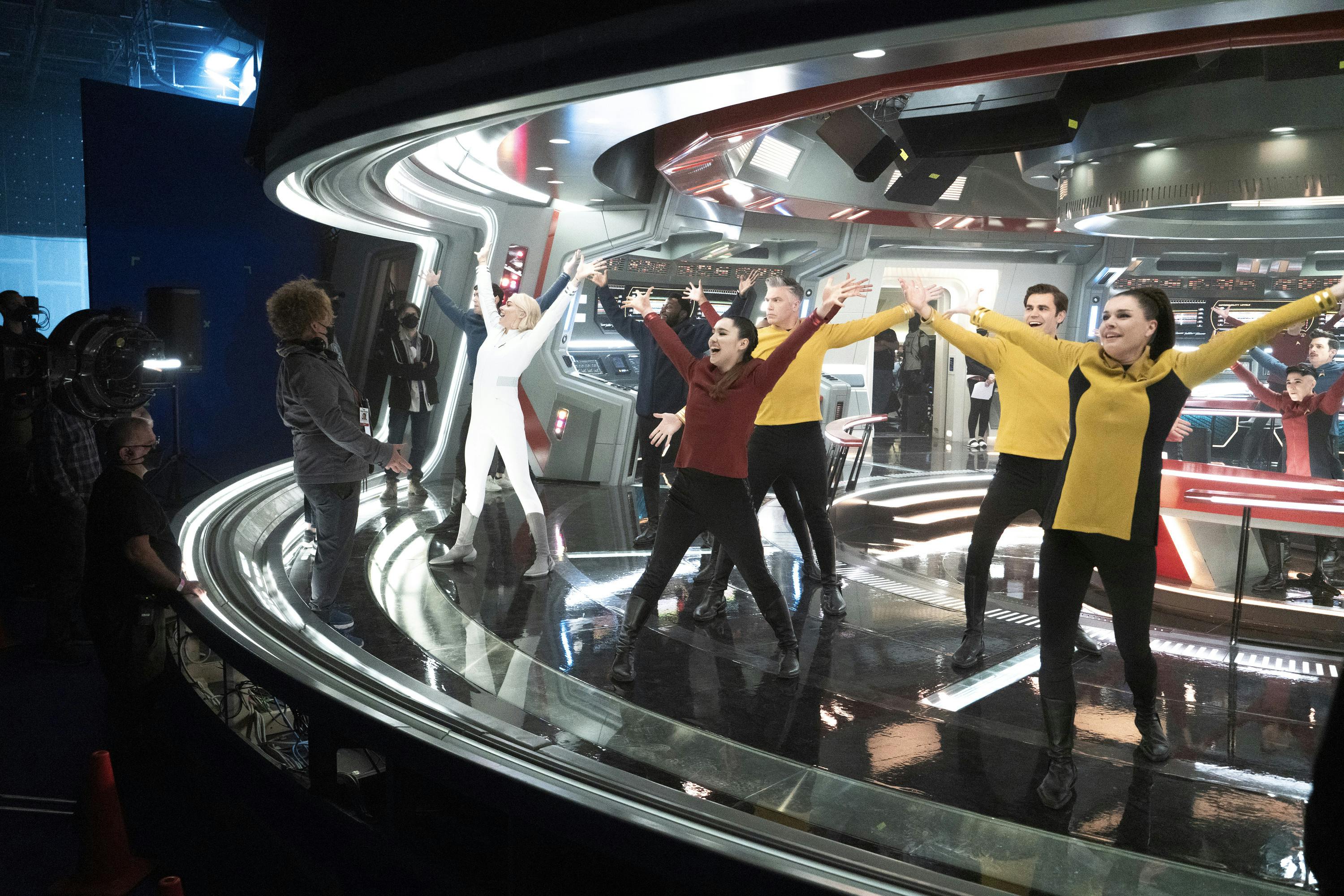
Behind-the-scenes of "Subspace Rhapsody"
StarTrek.com
Chong shares a memory of her first time at the recording studio, "I walked in on Rebecca singing. I think you just finished singing, recording, 'Keeping Secrets.' And I walked into the studio and listened to the playback of her singing. And I had tears in my eyes. It was so amazing to see your fellow cast mates doing something so incredible and out of the box for what we signed up to originally was just... really amazing."
Even the initially skeptical Peck was "blown away by the whole experience," and found himself "very moved by it."
On the the experience overall, Navia explains, "They've thrown at this cast so many different genres and so many different obstacles, and every single person here goes above and beyond. So when I heard we were doing musical, I was not in the least concerned, just, I was very curious about what the story was going to be. And I think all of us, we knew about the musical for so long. We were rehearsing, we were training, we were singing. And then when we finally got the script, I'll never forget being there, and it was Anson. We were in the transporter room. And I think I was with Babs, and Anson looked up from the script and he was like, 'This is incredible. This is really good.' And I was like, "Anson said it. Oh my goodness, what is about to happen?' So we knew that the script was good, and we knew that we were all going to pull it together, and it was a blast.
The cast was also quick to proudly note that the "Subspace Rhapsody" album "even beat Taylor Swift one day," along with the Barbie soundtrack.
Klingon Opera vs. K(lingon)-Pop
Star Trek: Strange New Worlds - Make Your Blood Scream (Garkog's Version)
One of the hotly debated moments to come out of "Subspace Rhapsody" was inclusion of a Klingon moment in the middle of "We Are One." When Captain Pike hails the Klingons, the fleet, led by Bruce Horak, who played from the first season, busts out in pop beat like a boy band.
Mount provides viewers insight to how they came to that creative choice, "Speaking of the Klingon boy band, so when you do a show, you're getting a lot opinions coming in at you from every direction. And this network, I have to say, has been really, really amazing about leaving us mostly alone to try these crazy things. But the Klingon boy band was one thing where they went, 'Whoa, hold on. Hold on. Could it be something a little bit more serious? That is more Klingon-like, like opera.'"
"We were like, 'Klingons have opera,'" continues Mount. "The plot point is that they're embarrassed. So why would they be embarrassed of doing opera? We actually had to shoot two different versions of that scene to show them that one worked, and the other one just kind of didn't. And so when they saw it, they let us get away with the boy band thing."
Gooding points out, "The operatic version is . So if folks are looking for where it is, it's somewhere. It's somewhere out there."
Cerritos Energy vs. Enterprise Energy
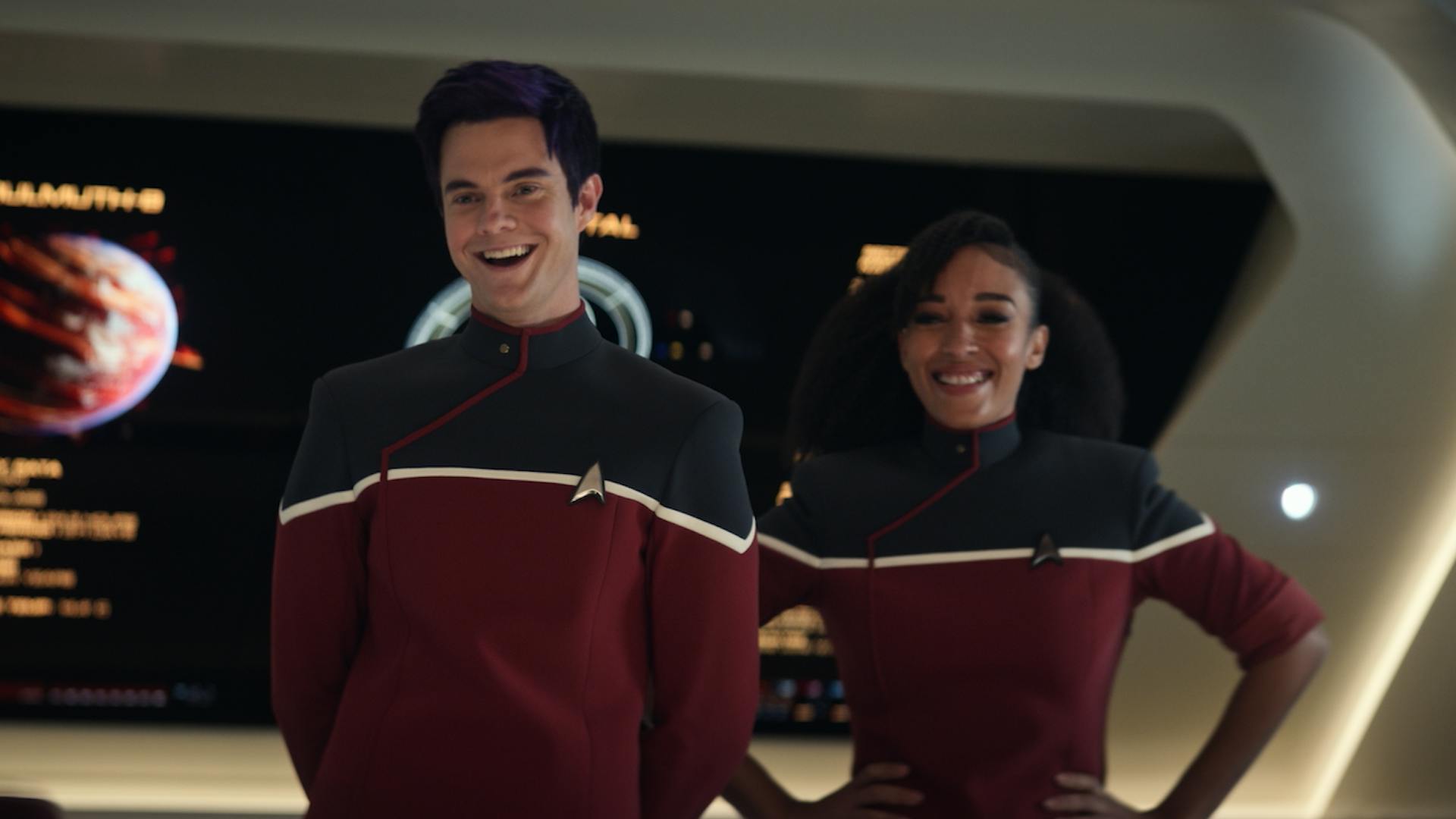
"Those Old Scientists"
StarTrek.com
The second season also welcomed Star Trek: Lower Decks' Tawny Newsome and Jack Quaid, bringing their animated characters to the wonderful world of live-action, in "," an episode directed by the legendary Jonathan Frakes.
What was it like for the cast to match Lower Decks' really fast dialogue?
Mount and Romijn credit Frakes as the ingredient that made the episode work. "The episode really could not have happened without Jonathan Frakes who directs on both series," states Mount. "He was really the perfect person. And with the deep knowledge of Trek, to be able to come in and help meld those two tones together. It was really important that he was there at the helm of that."
"The energy on an animated show, voice-wise is going to be different than on our show," adds Romijn. "Watching them figure out how to massage that with the help of Jonathan Frakes was crucial."
The Yin and Yang of 'Spoimler'
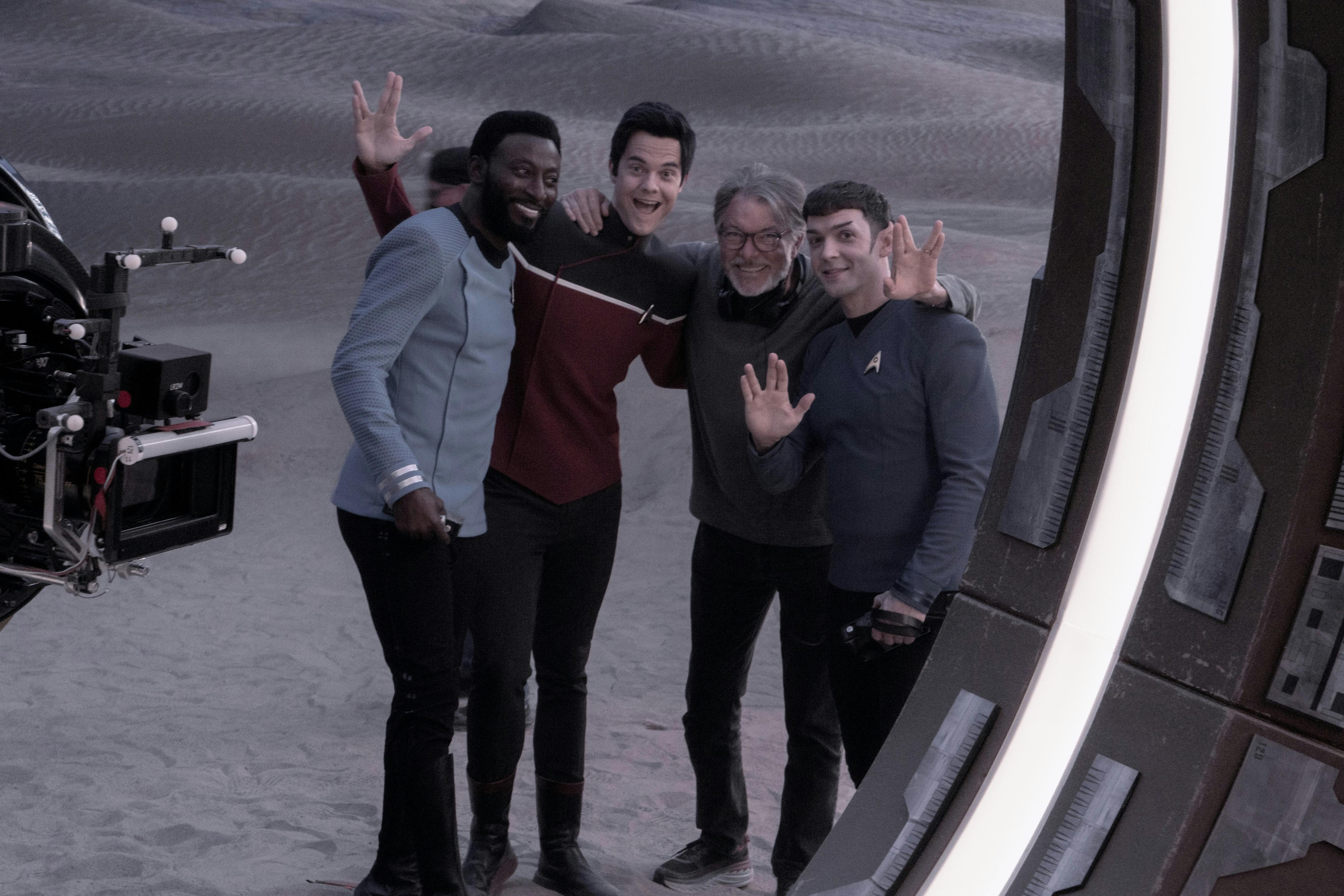
Behind-the-scenes of 'Those Old Scientists'
StarTrek.com
Reflecting on the Brad Boimler and Spock dynamic and working with Quaid, Peck divulges, "Indeed, Spoimler is a Frakes invention. It was great working with Jack. It's so fun because his character is such a nervous fella, and Spock is so the opposite, and they make a great yin and yang duo, in my opinion. I think Frakes tried to hone in on that. But I'd actually met Jack quite a few years before and was opining, I hope we get to work together someday. And this was just the most amazing venue to do that and with Frakes. So it was a blast working with him."
Mariner and the Evolution of Uhura

"Those Old Scientists"
StarTrek.com
Gooding highlights one of the benefits of being a prequel series is that you can see how a character evolves from who you're introduced to in Strange New Worlds and how they become the beloved characters we know and love in The Original Series. In the case of Nyota Uhura, the presence of Newsome's Beckett Mariner was essential.
"I love Tawny Newsome so, so, so much," praises Gooding. "That's a friend for life now. So I'm very grateful to have an opportunity to work with her. Kind of like what Ethan said with the yin and yang, I feel like Uhura, Season 2, is very book focused, very no shenanigan-ry allowed. And Mariner, as a character, is shenanigans full speed ahead."
"Having her be the one to bring out the more playful side of Uhura, I think, is very important because when we're working in a prequel," Gooding continues. "It's important to show the moments and the interactions and the events that mold the characters into the versions of them we'll recognize later. And so the playful nature of Uhura that she inherits, that we see in The Original Series... it's really special to think that, oh, Mariner inspired that in her. That relationship, this moment, was the thing that gave her freedom to let her very short hair down and just have a good time. And Tawny is such a sunflower of a person. And so for her to be the one to bring that energy out of Uhura, and also in turn, bring that energy out of Celia."
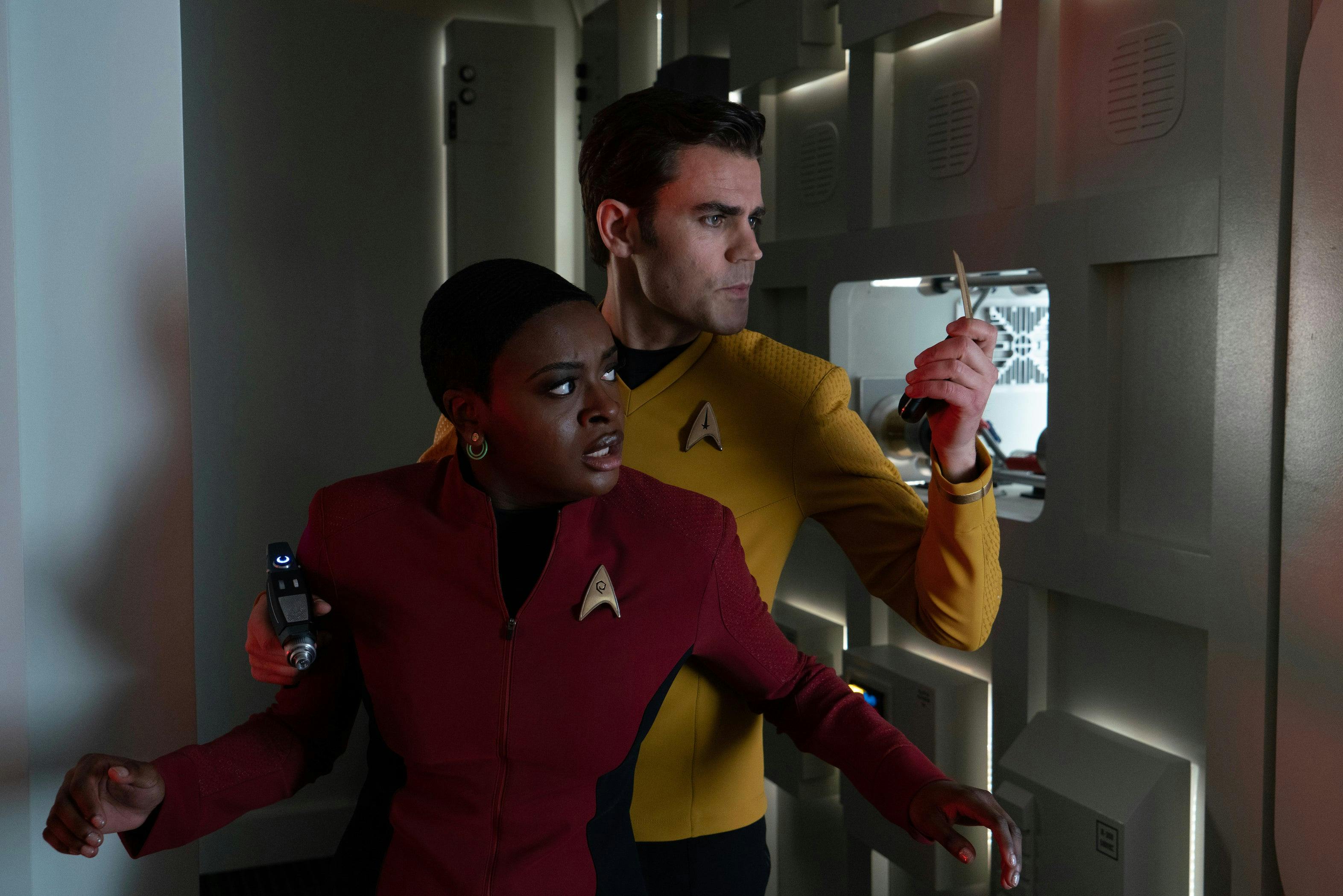
"Lost in Translation"
StarTrek.com
Later in the discussion, Gooding elaborates more on Uhura's journey following the loss of Hemmer at the end of the first season, "I put a lot of my journey with being young and having to grieve loved ones earlier than an age that is fair. A lot of it was just me turning inward and doing a lot of, what's that word? What archeologists do. Excavating."
"A lot of pulling away that dirt and being very precious with the bones of her feelings," continues Gooding. "And my journey with her was just trying to remain honest and then doing the actor thing of knowing the future version of herself, but having to abandon it. And knowing that she becomes this person, this very joyful, very graceful, very knowledgeable person. But what we do in a prequel is explaining how we got to point B from point A. And Uhura's story is filled with a lot of mourning. She mourns her parents, her family, her best friend, but also the life that she lived before she was a Starfleet officer, when her family was still around."
In "Lost in Translation," Uhura finally meets James T. Kirk. On getting to this moment, Gooding reveals, "Paul Wesley, our Kirk, he was such a perfect springboard. He was such a really just open player and somebody who really kept Uhura from really spiraling and hitting rock bottom. He was someone who was constantly keeping her intellectually activated. And that's where my Uhura feels very safe in her cerebral place."
"That episode, and this moment in her relationship with Hemmer and her budding relationship with Kirk, it's going to inform the rest of her journey," says Gooding. "I am excited to see the parts of it that she may want to hide, or the parts of it that reveal themselves to her as she continues to grow and continue to grow into the version that version of Uhura that we know in the future."
More-tegas, More Genres
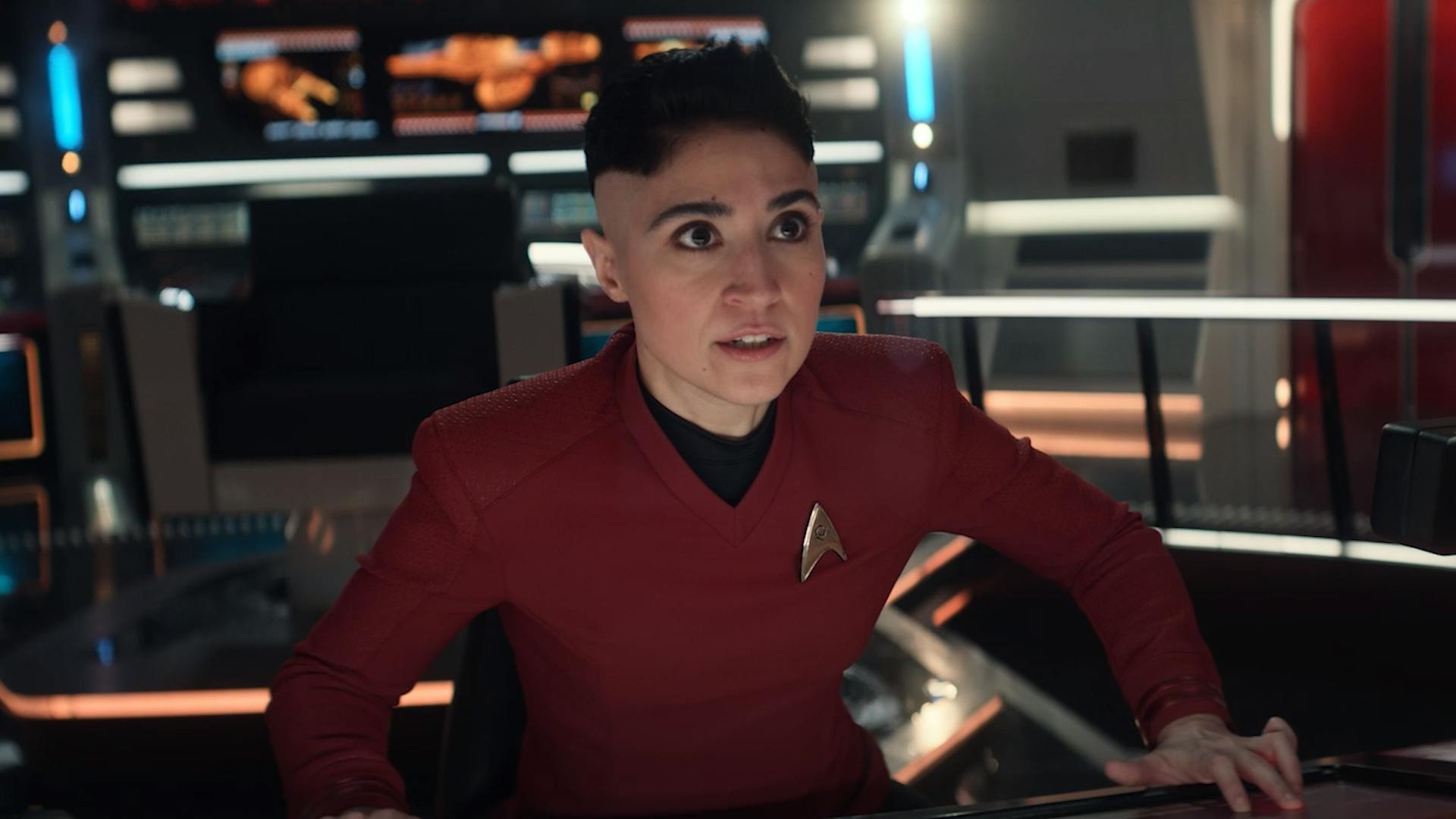
"Among the Lotus Eaters"
StarTrek.com
Romijn enthusiastically shares, "I'm going to go ahead and say it. For Season 3, get ready for some more Ortegas."
Navia is blown away by the reception to her character, Lt. Erica Ortegas. "It's been so wonderful when you hear it from fans, and I also hear it from you guys, and I hear it from producers about how much everybody wants more of a character," says Navia. "Like that, again, as an actor, I mean, you could want nothing more. What my response always is, is we have such a fantastic ensemble and we have 10 episodes a season, and the reason that every episode feels like a mini movie is because so much goes into it."
"What our writers have been able to do, and our producers, and our crew, and our creative, and our crew behind-the-scenes have been able to do is really pack so much into each episode where we're able to get storylines for all of us and then also our incredible guest stars," Navia praises. "It feels like from the get-go that you have known these characters for much longer than we have been on your screens."
Navia delights in the opportunities Strange New Worlds gets to explore different genres and embark on new adventures. "There's always a scientific explanation for why we are suddenly dressed in medieval garb, and again, in space," explains Navia. "But it allows us to do so many different things. As an actor, it is a dream role where you get to play really everything you wanted to play throughout your career, you get to do in a season. And after Season 1, I was like, what can they possibly come up for Season 2? And they have shown us. And now that we have been renewed, many things to come in Season 3."
In the Kitchen with Captain Pike
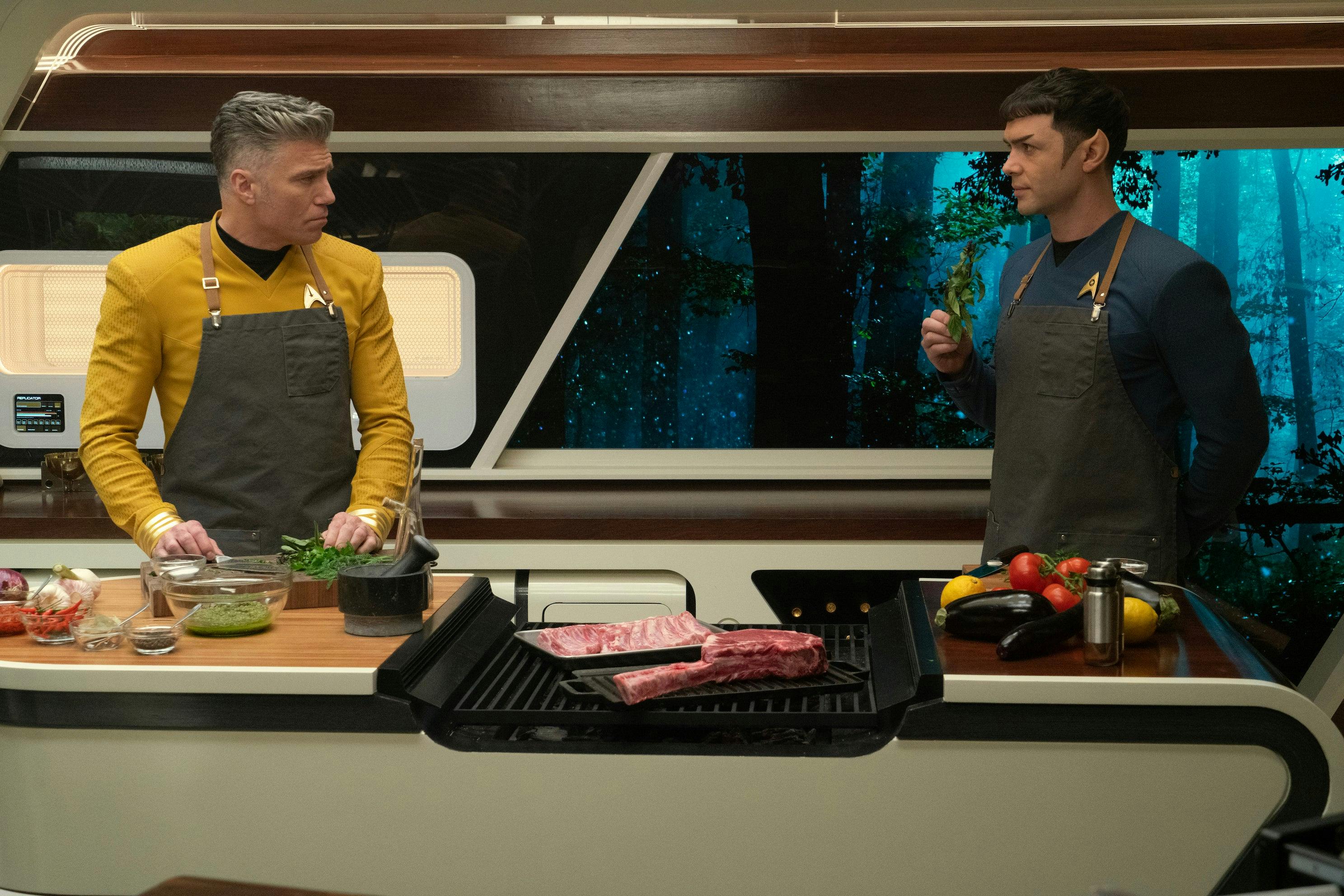
"Charades"
StarTrek.com
One of the elements Mount was able to showcasing the man Pike is when not on duty, which he workshopped with showrunners Akiva Goldsman and Henry Alonso Myers. Recalling a character planning session in the writer's room ahead of the first season, Mount shares, "There's very few things about Pike that I know. And one of them is that when any crew member comes to see him with a concern, everything else goes away. It's all about this person right in front of him, because that's his greatest asset. He's smart enough to know that his crew is really the engine that runs the Enterprise."
"For some reason, that sparked an idea in Akiva who said, 'I'm getting a picture of maybe captain's table dinners," Mount continues. "I said, 'Oh, wait a second. What if, because he's a horse guy, so he can't take his horse on the Enterprise. What if each captain gets one ask for their quarters, one special ask, and what if Pike's other thing is cooking and so he asks for a kitchen?'"
Echoing Navia, Mount gives us a tease of what's to come for the next season, "I can tell you that the genre conversation has continued. And what's interesting is that, I believe the strike is what got in the way of our between seasons conversations. When we came back to the table and Akiva says, 'Hey, this is what we've got planned.' I was amazed that there were a couple of ideas in there that came right out of my notes of that stuff I was going to pitch. And there's some really fun ideas and some really good character development that we're all excited to tackle."
Diving into M'Benga and Chapel's War-Weary Past
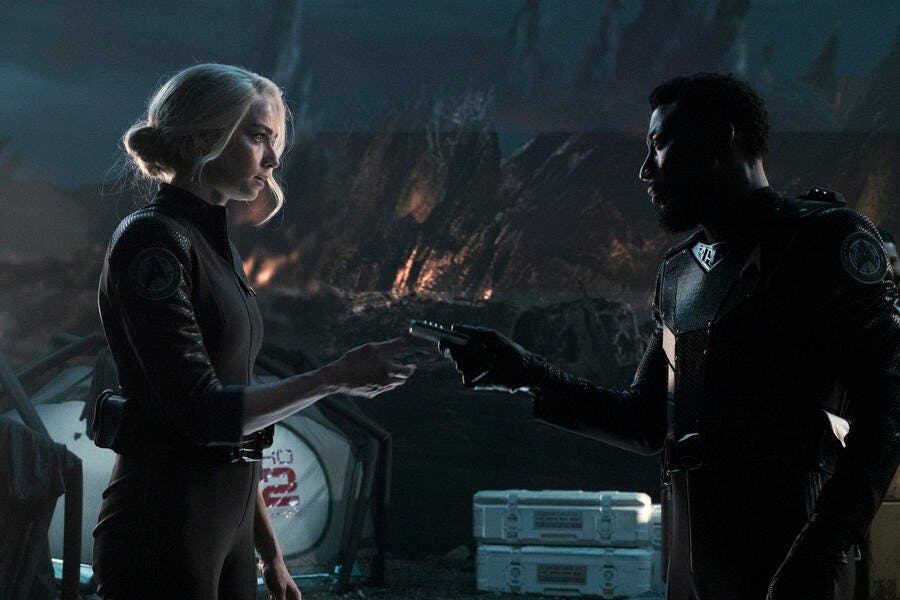
"Under the Cloak of War"
StarTrek.com
Olusanmokun reveals a key character insight he received prior to production of the series, "Before we started shooting the first season, Akiva had said to me [that M'Benga] used to be a man of violence. Something along those lines. And so I had wondered what could have brought that about, and I'd gone towards this direction of, yes, he was a man consumed by war at some point. And so that was already getting layered into what he was in the first season."
"And then in the second season, we just unlayered some of that," Olusanmokun adds. "It was a beautiful script to get from Davy Perez, and there was just this journey of going deep into the psyche and the past of Dr. M'Benga and him finding a way to really walk out of the darkness. But going back into the darkness, of course we did in Season 2, and just exploring that and the depths of that and his reluctance to be involved, and how he had tried to get out and he kept being pulled back in."
On the constraints of an ensemble cast and 10-episode season, Olusanmokun notes, "I's a real wonderful treat to walk in the shoes of this character, and I'm sure my cast mates feel the same way about their characters. The showrunners and the writers, I think they've been honorable enough to spread the wealth, and I think that's very important because there's eight of us and it would really, really, really suck to be standing on the headlines throughout and having pitter-patter dialogue and whatnot. So to go through what I went through in Season 1 and have what I went through in Season 2, for me, is just a beautiful blessing."
With the episodic nature of Strange New Worlds, the second season traversed from the crossover episode, to a heavy war episode, to a musical one, and then action-packed, horrific cliffhanger finale.
"When we were shooting the Klingon War episode, there was overlap with the musical," says Bush, "and I had quite a big number in the musical and also was quite heavy in the Klingon episode. So there was days where I would come from the AR wall where we had explosions and medical. We were operating on somebody who was hanging on by a thread. And then I would go straight from there to go and practice being lifted up by six dancers and being spun around in the air, which at first, I was like, crap, that's going to be an interesting transition. But it was actually perfect. It was really good to just cut through the intensity and keep my body in this healthy place."
Delving into the second season's "Under the Cloak of War," Bush shares, "Season 2 for me was wonderfully challenging and stretching in so many ways. And on what Babs was speaking about with episode eight, I also just wanted to shout out to Jeff Byrd, the director of that episode, because he was perfect for that. He was such a perfect director for that episode. He was so patient and just so generous with allowing us to go as deep and intellectual and bodily and just look at it from every single angle and really pull it apart and knot it out, and talk and talk and talk to find the truth of that complex experience."
"For me, the standout experience in that was discovering the depths of Chapel and M'Benga's connection and the genesis of that," adds Bush. "It's a really unique bond that they have. It's familial. There's something about it that's really non-verbal and very intimate. There's like a protector slash mentor. And I think that understanding where that comes from in such a holistic and deep way was so illuminating and satisfying and has brought so much depth to that for me. It was a very, very special experience, that episode for me. Unforgettable."
Spock the Human

"Charades"
StarTrek.com
Peck reveals that initially when he got the role of Spock, it was daunting for him because "this is a very important character to a lot of people."
What has alleviated the pressure is getting to explore new aspects of a much younger Spock, especially as seen in "Charades," which Peck recalls "a fun experience because I need to honor this character, and then do something that's never the character."
"I just have such an amazing cast to work with and I feel safe working with them," remarks Peck. "And the director Jordan Canning was really game to play and understood what I was wanting to do with that version of Spock which was, how far can we take him from who he is, but still recognize Spock in him. And it's an exercise in daringness in a way."
Peck also calls out Spock's relationship with Christine Chapel, "Spock has these teachers that teach him about his humanness throughout his life, and Chapel is one of them. And that's a really special connection. Jess is so wonderful to work with and informing as well of the performance. The characters don't exist without each other, so it was so fun to do that with her."
"At the end of that episode, I was really heartbroken to say goodbye to human Spock," shares Peck. "Because all these things existed beneath the surface. And so, to really wear them on his sleeve was such a relief. And then to have to put it all back away was really sad for me. It was a really interesting experience. Really wonderful. And again, so grateful for that script and so appreciated receiving that."
Romijn interjects asking Peck if Spock remembers what it felt like to be human Spock.
Reflecting, Peck states, "Rebecca, that's a very good question. So that's something that I'm rolling around in my brain as we head into Season 3. How human is Spock now on his path to becoming Leonard Nimoy Spock, at the beginning of The Original Series? How human is he? Thinking about this the other day with Chris Fisher, our directing producer. And I think he remembers all of it. But it's like he's taking drugs and he's had this otherworldly experience. And so he can't really quite inhabit it like he used to, but there'll still be the information, I imagine."
The Impact of Starfleet's Poster Girl
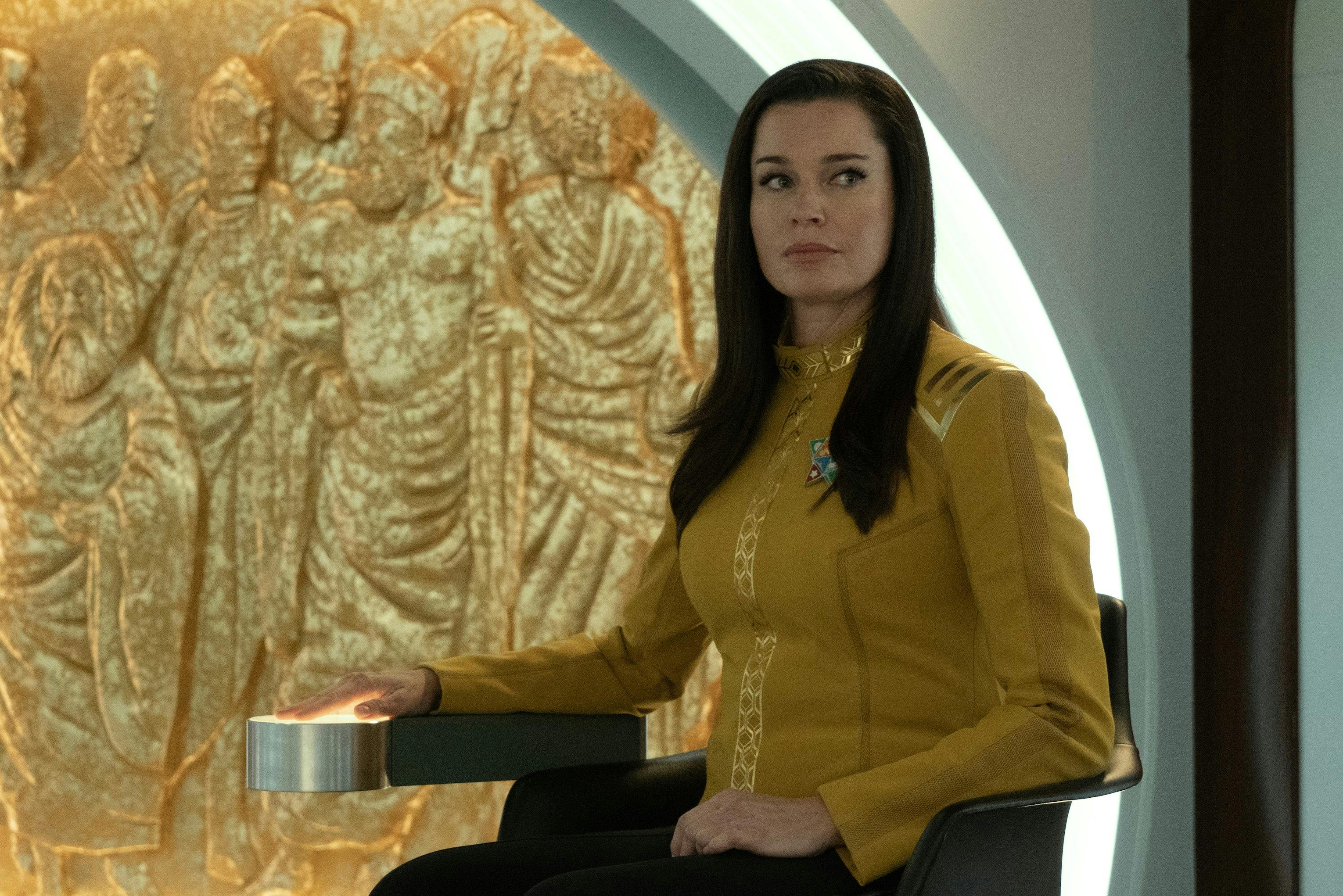
"Ad Astra per Aspera"
StarTrek.com
The arrival of Lower Decks' Brad Boimler and Beckett Mariner meant that the crew of the Enterprise got a hint of their impact on future generations, especially in Starfleet.
At the start of the second season, Romijn's Una Chin-Riley had to come to terms with the consequences of withholding her Illyrian background — a strict Federation violation. On the experience, Romijn reflects, "It was a real honor to get to take on one of the legacy courtroom dramas for Star Trek. Una had spent the first season, and probably for years before the first season, with years of shame carrying around this terrible secret of being a genetically-modified Illyrian, which is not allowed in Starfleet, and putting Captain Pike at risk for giving her asylum. So to be able to go through the courtroom drama at the beginning of Season 2 and shed that burden, I think is a real turn for her character for the rest of Season 2 and moving forward to get rid of that burden of shame."
It's this shedding of burden that Chong noted earlier in the panel discussion with watching Romijn's musical number, "Keeping Secrets," and how that number impacts her character La'An Noonien-Singh who views Number One as a role model, mentor, and close friend.



